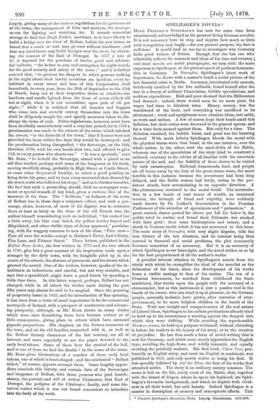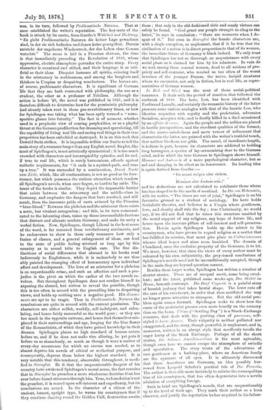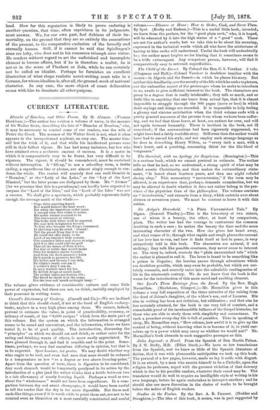SPIELHAGEN'S NOVELS.*
ments for lighting and watching, &c. It sounds somewhat HERR FRIEDRICII SPIELHAGEN has now for some time been strange to find that flugh Eccles, merchant, is to have liberty to unanimously acknowledged as the greatest living German novelist.
It is not necessary here to stop and inquire how much or little broad that a coach or cart may go over without hindrance ; and such recognition may imply,—for our present purpose, the fact is that any inhabitants may build bridges over the river, by obtain- sufficient. It would lead us too far to investigate why Germany ing the consent of the Earl of Donegal. In 1677 a rate of lacks good writers of fiction. Enough that she has one who £6 is imposed for the purchase of twelve good and substan- admirably reflects the manners and ideas of his time and country ; tial halberts, " the better to arm and strengthen the night-watch, and since novels are social photographs, we turn with the more for the good security and safety of the town ;" and it is further eagerness to Spielhagen, at the present epoch of perilous fermenta-
enacted that, "to prevent the dangers to which persons walking tion in Germany. In Sturmflut, Spielhagen's latest work of in the night about their lawful occasions are incident, every in- importance, he draws with a master's touch a social picture of the late financial crisis in Berlin. Germany, intoxicated with success, fictitiously enriched by the five milliards, found herself after the war in a frenzy of military Chauvinism, bubble speculations, and reckless expenditure. Rich and poor deemed that the Millennium had dawned ; indeed, there would soon be no more poor, for wages had risen to fabulous rates. Money, money, was the watchword of the hour, and everything was sacrificed to its attainment ; truth and uprightness were obsolete ideas, cast aside, as worn and useless. A few of course kept their heads amid this delirium, but their voices were drowned in the general uproar, and for a time facts seemed against them. But only for a time. The delusion vanished, the bubble burst, and great was the bursting thereof. With much felicity Spielhagen blends the moral with the physical storm-wave that burst, in the one instance, over the whole nation, in the other, over the sand-drifts of the Baltic, whereon one of the speculators of the story tried to construct a railroad, contrary to the advice of all familiar with the uncertain nature of the soil, and the liability of these shores to be visited by such catastrophes. Railroad, homesteads, land, and people are all borne away by the fury of the great storm-wave, the more terrible in this instance because the occurrence had been long delayed, and the Baltic waters had lately, owing to the per- sistent winds, been accumulating in an opposite direction. A like phenomenon occurred in the moral world. The accumula- tion in a few hands of vast stores of wealth, an unnatural tension, the triumph of fraud and cupidity, were suddenly made known by Dr. Lasker's denunciation in the Prussian Parliament of the swindles of speculators and " promoters." A panic ensued, shares quoted far above par fell far below it, the public tried to realise, and found their Eldorado was stocked with fairy gold ; then came bankruptcies and misery, and a shock to German credit which it has not recovered to this hour. The main story of Stern:J/0, with very slight disguise, tells the true history of the late disasters, and its interest being thus centred in financial and social problems, the plot necessarily becomes somewhat of an accessory. But it is an accessory of which Spielhagen never loses sight, and the novel strikes us as by far the best proportioned of all the author's works.
A peculiar interest attaches to Spielhagen's novels from the nicety with which he exemplifies the ideal of the novelist as the delineator of his times, since the development of his works bears a visible analogy to that of his nation. The son of a Prussian bureaucrat, he watched from childhood the State machinery, that works upon the people with the accuracy of a chronometer, but as this instrument is just a passive tool in the hands of its owner, who can wind it up at pleasure, so the German people, naturally inelastic, have grown, after centuries of over- government, to be mere helpless children in the hands of the State. With rare insight and comprehension of the real nature of Liberal ideas, Spielhagen in his earliest productions already tried to hold up to his countrymen a warning against the dangers into which they were drifting. While avoiding the reprehensible Tendenz-roman, he held up a purpose to himself, without obtruding it before his readers to the injury of his story, or to the creation of prejudice. He has thus made a form of novel-writing that is
new for Germany, and which more neatly approaches the English type, avoiding the high-flown and wildly romantic, and equally
avoiding the painfully realistic. His first book, Clara Vere, pro-
fessedly an English story, and most un-English in sentiment, was published in 1857, and only merits notice as being his first. It
was speedily followed by Auf der Dune, the first of his works that
attracted notice. The story is an ordinary society romance. The scene is laid on the flat, sandy coast of the Baltic, that, together with the island of Riigen, where he spent his boyhood, are Spiel- hagen's favourite backgrounds, and which he depicts with vivid- ness in all their weird, but arid beauty. Indeed Spielhagen is a master in description of scenery and atmospheric effects. This
* Friedrich Spielhagen's Samnitliche Werke. Leipzig: Staaekilletn. 1872-1878. was, in its turn, followed by Proldematische Naturen. That at once established the writer's reputation. The key-note of the book is struck by its motto, from Goethe's Wahrheit und Diehtung, "Es giebt Problematische Naturen die keiner Lage gewachsen Bind, in der sie rich befinden und denen keine genugthut. Daraus entsteht der ungeheure Wiederstreit, der das Leben ohne Genuss verzehrt." The scene is laid in a Prussian château, the time is that immediately preceding the Revolution of 1848, whose oppressive, electric atmosphere pervades the entire story. Every character is unnatural and stilted, and their language is as arti- ficial as their ideas. Disquiet harasses all spirits, evincing itself in the aristocracy in recklessness, and among the burghers and thinkers in Utopian or despairing conclusions. The heroes are, of course, problematic characters. It is significant of German life that they are both connected with philosophy, the one as a student, the other as a professor of Nihilism. Although the action is before '48, the novel was published in 1861, and it is therefore difficult to determine how far the pessimistic philosophy had already taken root in those pre-revolutionary times, or how far Spielhagen was taking what has been aptly termed a " retro- spective glance into futurity." The fact is of moment, whether used in a prophetic view of coming perplexities, or as a playful thrust at the German predilection for dreaming and speculating, till the capability of living real life and seeing real things in their true proportion has been enfeebled or destroyed. It is on this rock that Oswald Stein strikes. It is impossible within our limits to tell the main story of a romance longer than any English novel. Its plot, like most of Spielhagen's, is not artistically symmetrical ; it is too much crowded with characters and interrupted by episodes, and its end, if true to real life, which is rarely harmonious, offends against esthetic requirements, for " it ends in a squirrel-path, and runs up a tree." It was succeeded by a continuation, Durch Nacht zum Licht, which, like all continuations, is not so good as its fore- runner, but which possesses the curious attraction which renders all Spielhagen's novels, when once begun, so hard to lay aside. The tenor of the books is similar. They depict the impassable barrier that exists between the aristocracy and the middle-class in Germany, and emphasise the dangers that have resulted, and will result, from the insensate pride of caste evinced by the Prussian "blue-blood." Between the plebeian and the aristocrat there exists a mute, but virulent antagonism ; and this, in its turn communi- cated to the labouring class, raises up those irreconcilable factions that distract and alienate modern Germany, and make its unity a verbal fiction. Now, Spielhagen, though Liberal in the best sense of the word, is far removed from revolutionary sentiments, and he endeavours to show in these early romances how only a fusion of classes, and a general enlargement of ideas, can lead to the state of public feeling attained so long ago by this country as to sound trite to English ears. The fine dis- tinctions of social differences that abound in his books read ludicrously to Englishmen, while it is melancholy to see thus ably painted the cramping effect of bureaucracy upon individual effort and development. The love of an aristocrat for a plebeian is an unpardonable crime, and such an affection and such a pre- judice is the pivot on which the earlier of the two novels re- volves. But throughout Spielhagen does not confine himself to exposing the absurd, but strives to reveal the possible, though this is too often in accord with the prevailing bias to despairing views, and holds up nothing save a negative good. His ddnoue- mcnts are apt to be tragic. Thus in Problematische Naturen the conclusions are quite in accord with the current pessimism. The characters are either selfish, worldly, self-indulgent, and calcu- lating, and hence fairly successful as the world goes ; or they are too much in the opposite extreme, and hence find themselves mis- placed in their surroundings and age, longing for the blue flower of the Romanticists, of which they have gained knowledge in their dreams. Spielhagen places no high standard of human nature before us, and if be does not make vice alluring, he yet puts it before us so shamelessly, so much as though it were It matter of every-day occurrence for which no excuse was needed, as to almost deprive his novels of ethical or esthetical purpose, and consequently, depress them below the highest standard. It is very notable that this tendency, observable throughout, is modi- fied in Sturinflut. Be it that the unquestionable dangers of his country have awakened Spielhagen's moral sense, the fact remains that in Sturmfiut he preaches a more wholesome doctrine than has ever before found utterance through him. True, its foundation is not the grandest, it is reared upon self-interest and expediency, but its conclusions are sound. In the character of a citizen of the ancient, honest, upright type, he warns his countrymen that if they continue dancing round the Golden Calf, destruction awaits them ; that only in the old-fashioned civic and manly virtues can safety be found. " God grant our people strength to cling to the latter," he says in conclusion ; " there are moments when I de- spair of it." But even in Start/Vita the female characters are, with a single exception, so unpleasant, that if it be true that the civilisation of a nation is in direct proportion to that of its women, the immediate future of Germany is black indeed. We only trust that Spielhagen has not so thorough an acquaintance with every social phase as is claimed for him by his admirers. In vain do we seek among these sensual women, dead to all notions of pro- priety and self-restraint, who remind us too often of the worst heroines of the younger Dumas, the naive, insipid creatures whom we encounter, not only iu fiction, but iu real life, as repre- sentatives of German women.
In Reih und (flied was the next of these social-political romances. It deals with the period of reaction that followed the outbreak of 184$. The hero, Leo, has been identified with Ferdinand Lassalle, and certainly the romantic history of the latter presents some curious analogies with that of the fanatic Leo, who likewise coquettes with royalty and the proletariat, advocates Socialism, accepts a title, and is finally killed in a duel occasioned by an affilire de min-. Again the people and the nobles are placed in hostile juxtaposition, and the excellent qualities of the former, and the coarse-mindedness and mere veneer of refinement that characterise the latter, are painted with the writer's truthful touch, that neither blackens nor gilds. The novel, of inordinate length, is tedious in part, because its characters are addicted to holding long harangues, a species of lay-sermonising dear to the German mind, and in which the true German in Spielhagen shows himself. Hammer and Ainhoss is of a more psychological character, but as sad and damping in its effect as its forerunner. Its leading idea is again derived from Goethe :— " Du muse, stoigen odor sinkon.
Hammer odor Mobiles coin ;"
and its deductions are not calculated to exhilarate those whom fate has shaped to be the anvils of mankind. In Die von Ilidienstein, with its motto, " The times are out of joint," Spielhagen is on his favourite ground as a student of sociology. Its hero holds Socialistic theories, and believes in a Utopia where gentleness, love, and charity shall rule the day ; true Christianity, we would say, if we did not find that he raises this structure unaided by the moral support of any religions, any hope of future life, and hence upon the insecure pillars of self-interest and self-preserva- tion. Herein again Spielhagen holds up the mirror to his countrymen, who have grown to regard religion as a matter that has fulfilled its mission, that must give place to Culturinteressen whence ideal hopes and aims seem banished. The domain of Cloudland, once the exclusive property of the Germans, is to let. We trust, however, that since the views of every author must be coloured by his own subjectivity, the grey-toned conclusions of Spielhagen's novels need not be unconditionally accepted, though in the main they are beyond question correct.
Besides these larger works, Spielhagen has written a number of shorter stories. These are of unequal merit, some being excel- lent ; and the latest, published some weeks ago, Des Skelett im Hause, beneath contempt. Die Dorf Coquette is a painful story of boorish jealousy that takes brutal shape. The lover cuts off the ears of his sweetheart, in order that thus mutilated she may no longer prove attractive to strangers. But the old social pro- blem again comes forward. Spielhagen seeks to show how the curse of the proletariat presses even more heavily on the country than on the town. Ultimo (" Settling Day ") is a Stock-Exchange romance, that deals with the pushing class of parvenus, self- styled la haute finance. Their vulgarity is neither palliated nor exaggerated, and the story, though powerful, is unpleasant, and is, moreover, written iu an abrupt style that needlessly recalls the eager hurry of the Stock Exchange. Perhaps of all the short stories, Die Schikun A merikaimerinen is the most agreeable, though even here we cannot escape the atmosphere of swindle and speculation. The story treats of the adventures of two gentlemen at a bathing-place, where an American family are the cynosure of all eyes. It is ultimately discovered that these Americans are Germans, an idea possibly bor- rowed from Leopold Schefer's poetical tale of Die Perserin. The author is thus able more incisively to satirise the cosmopolitan bias of his countrymen, that too often degenerates into a servile adulation of everything foreign.
Such in brief are Spielhagen's novels, that are unquestionably up to the level of their age. They mark their author as a keen observer, and justify the reputation he has acquired in his father-
land. How far this reputation is likely to prove enduring is another question, that time, often capricious in its judgments, must answer. We, for our own part, feel dubious of their im- mortality, on the ground that they are so entirely the emanations of the present, to the comparative exclusion of the broadly and eternally human. Still, if it cannot be said that Spielhagen's aims are lofty, vice does not in his romances triumph over virtue. He renders without regard to art the unfinished and incomplete element in human affairs, but if he is therefore a realist, he is not so in the sense of Flaubert or Zola, while he can certainly not be called an idealist. Perhaps he furnishes an excellent illustration of what shape realistic novel-writing must take in -a German, for whom idealism is, after all, the ground-wo rk of national character. In any case, the mere object of exact delineation seems with him to dominate all other purpose.




































 Previous page
Previous page